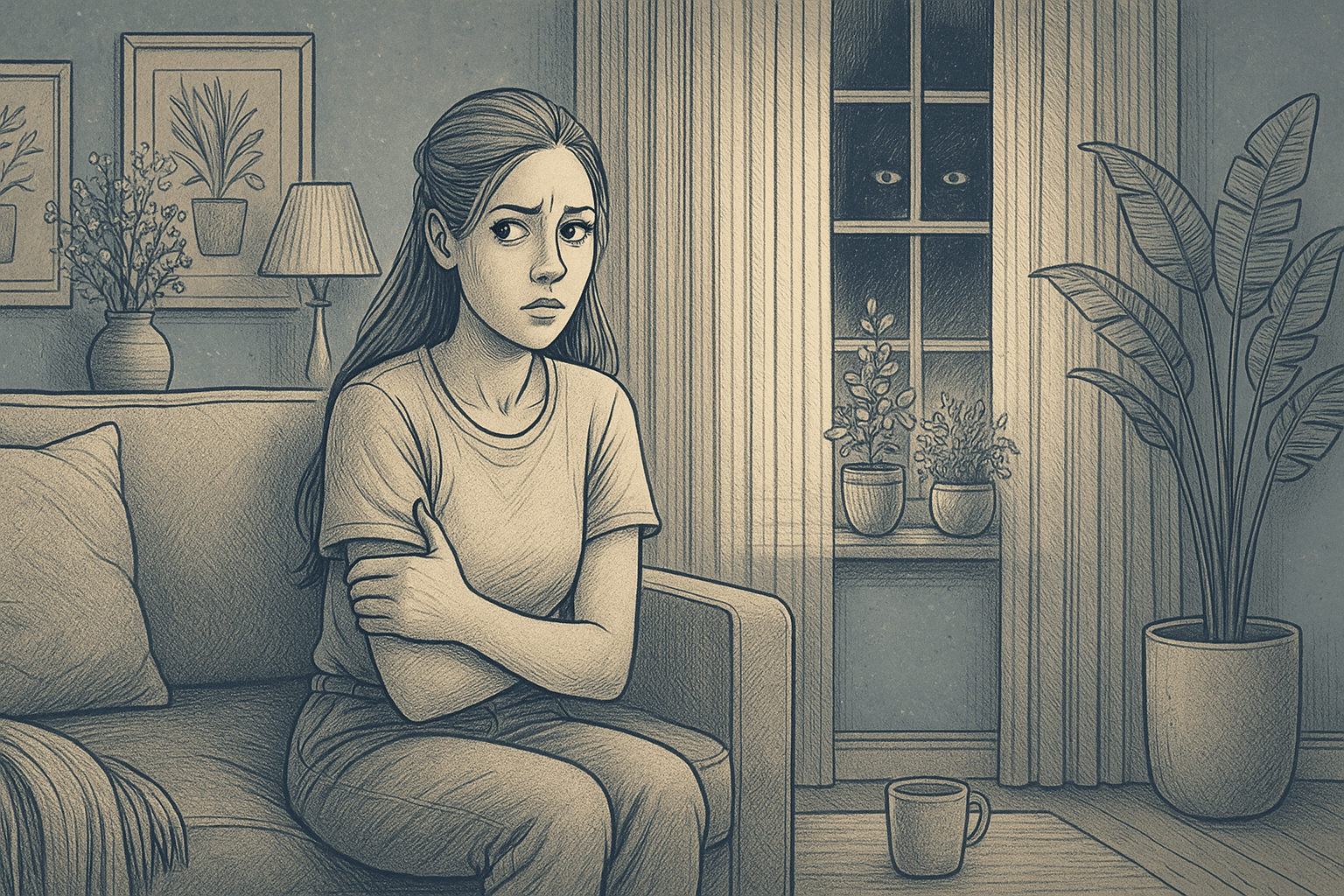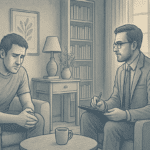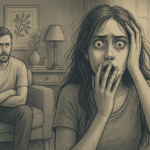Key Takeaways
- Delusional disorder involves fixed false beliefs that persist despite evidence to the contrary, yet allows individuals to function normally in many aspects of daily life.
- Early warning signs include persistent false beliefs, defensiveness when challenged, social withdrawal, and interpreting neutral events as significant or threatening.
- Unlike schizophrenia, people with delusional disorder often maintain normal functioning and have non-bizarre delusions that could theoretically occur in real life.
- Supporting someone with delusional disorder requires patience, avoiding direct confrontation of beliefs, and gently encouraging professional treatment.
- At A Mission For Michael, we have developed comprehensive treatment protocols specifically designed for delusional disorder, including CBT, medication management, intensive family support, and specialized approaches for individuals who lack insight into their condition.
What Is Delusional Disorder?
Delusional disorder is characterized by the presence of one or more persistent false beliefs (delusions) that remain fixed despite clear evidence to the contrary. Unlike some other psychotic disorders, people with delusional disorder often continue to function well in many aspects of daily life. The condition typically develops in middle to late adulthood, though it can appear earlier.
Differences from Schizophrenia
A crucial distinction between delusional disorder and schizophrenia is the absence of other psychotic symptoms typically found in schizophrenia. People with delusional disorder don’t experience the hallucinations, disorganized speech, disorganized behavior, or negative symptoms (like diminished emotional expression) that characterize schizophrenia. Their functioning remains largely intact, and the impact of their condition is often limited to topics related to their specific delusion.
Non-Bizarre Delusions
The delusions in this disorder are typically “non-bizarre,” meaning they involve situations that could theoretically occur in real life. Examples include beliefs about being followed, poisoned, infected, loved from a distance, or having a special unrecognized talent. This differs from “bizarre” delusions that involve clearly impossible scenarios, such as believing one’s internal organs have been replaced with someone else’s without surgery or that aliens control one’s thoughts.
Founded in 2010, A Mission For Michael (AMFM) offers specialized mental health care across California, Minnesota, and Virginia. Our accredited facilities provide residential and outpatient programs, utilizing evidence-based therapies such as CBT, DBT, and EMDR.
Our dedicated team of licensed professionals ensures every client receives the best care possible, supported by accreditation from The Joint Commission. We are committed to safety and personalized treatment plans.
6 Early Signs of Delusional Disorder: Examples & How to Help
Sign 1: Fixed False Beliefs

The cornerstone of delusional disorder is the presence of fixed false beliefs that persist despite clear evidence to the contrary.
Delusional beliefs aren’t simply opinions or misunderstandings, they’re convictions held with absolute certainty. Early in the development of this disorder, you might notice a loved one beginning to express increasingly rigid beliefs that seem unfounded or irrational. What makes this an early warning sign is the person’s unwillingness to consider alternative explanations, even when presented with clear contradictory evidence.
Persecutory Examples
Persecutory delusions are one of the most common types. In early stages, someone might begin expressing concerns that neighbors are monitoring their activities or that coworkers are deliberately sabotaging their work. They might install excessive security measures at home or frequently check for listening devices. As the condition progresses, these beliefs become more elaborate and entrenched.
Sign 2: Normal Functioning
A distinctive feature of delusional disorder that often delays diagnosis is that individuals typically maintain normal functioning in many areas of their lives. Unlike conditions like schizophrenia which may significantly impair basic functioning, people with delusional disorder often continue working, maintaining homes, and handling daily responsibilities. This preserved functionality can make the condition difficult to recognize, especially in early stages.
Subtle Social Changes to look out for
While overall functioning may remain intact, subtle social changes often emerge as early warning signs. You might notice a growing reluctance to participate in certain activities, increased secretiveness, or changes in communication patterns. These shifts typically relate to the content of developing delusions. For example, someone with growing persecutory beliefs might begin avoiding specific locations or people they believe are “in on” a perceived conspiracy.
Sign 3: Defensiveness About Beliefs
As delusional beliefs strengthen, individuals typically become increasingly defensive when these ideas are questioned. This defensiveness serves as a protective mechanism against challenges to their reality. In early stages, you might notice an unusual level of sensitivity around specific topics or beliefs, with reactions that seem disproportionate to the situation.
Anger When Challenged

A hallmark early sign is emotional reactivity when delusional beliefs are questioned.
Someone who is typically calm and reasonable may become uncharacteristically angry, agitated, or upset when others express skepticism about their beliefs. This emotional response often seems out of proportion to the conversation and may escalate quickly from mild irritation to significant distress.
These emotional reactions stem from genuine conviction in their beliefs and the frustration of not being believed about something they perceive as objectively true.
Refusal of Alternative Explanations
People developing delusional disorder consistently reject rational alternative explanations for their experiences. When presented with evidence contradicting their beliefs, they might dismiss it as fabricated, manipulated, or part of a larger conspiracy.
This unwillingness to consider other perspectives is more than simple stubbornness; it reflects the absolute certainty with which delusions are held.
Sign 4: Social Isolation
A concerning early warning sign is progressive social withdrawal and isolation. As delusional beliefs develop, relationships often become strained by disagreements about reality. The individual may feel others don’t understand them, don’t believe them, or are potentially part of perceived threats or conspiracies.
Withdrawal From Relationships
Early in the disorder’s development, you might notice someone increasingly declining social invitations, cutting conversations short, or seeming distracted during interactions. They may provide vague excuses for their absence or become visibly uncomfortable in social settings they previously enjoyed.
This withdrawal often begins selectively, perhaps avoiding specific people or situations related to their developing delusions, before potentially expanding to wider social avoidance.
Sign 5: Lack of Self-Awareness
People developing delusional disorder typically demonstrate poor insight into their condition; they don’t recognize their beliefs as unusual or problematic. This lack of self-awareness, called anosognosia, isn’t deliberate stubbornness but a genuine inability to perceive the delusional nature of their thoughts. From their perspective, they’re simply recognizing truths that others are missing or denying.
Inability to Recognize Delusions
When gently questioned about the plausibility of their beliefs, someone with developing delusional disorder typically expresses genuine surprise that others don’t see the situation as they do. They may react with confusion, frustration, or concern that others cannot perceive what seems obvious to them. This reaction differs from someone who acknowledges their idea might be unusual but maintains it anyway.
Sign 6: Persistent Suspicion
An elevated level of suspicion that extends beyond reasonable caution is a common early sign of developing delusional disorder, particularly the persecutory type. This heightened suspiciousness creates a baseline of mistrust that colors interpretations of everyday events and interactions. While healthy skepticism is normal, this suspicion is persistent, excessive, and typically lacks objective justification.
Misinterpreting Neutral Events
People developing delusional disorder frequently assign special significance to ordinary occurrences. A neighbor’s glance might be interpreted as surveillance, a computer malfunction as deliberate sabotage, or a casual remark as containing hidden threats. These misinterpretations build upon each other to reinforce growing suspicions.
Holding Grudges
An unusual persistence in maintaining grievances is common in early delusional development. Minor slights or disagreements that most people would forget become permanently significant and may be incorporated into broader belief systems about persecution or mistreatment. These grudges resist resolution through normal means like explanation or apology.
How To Help Someone With Delusions

Approaching someone experiencing delusional thoughts requires sensitivity, patience, and strategy.
Avoid Direct Confrontation
Directly challenging or arguing against delusional beliefs rarely proves effective and often damages trust. When someone presents a delusional belief, responding with immediate contradiction typically leads to defensiveness, reinforcement of the belief, or relationship strain. Instead, listen without explicit agreement or disagreement, acknowledging the person’s emotional experience without validating inaccurate beliefs.
Build Trust First
Establishing yourself as an ally rather than an adversary creates the foundation for potentially helping someone consider treatment. Demonstrate reliability, consistency, and respect in your interactions. Maintain regular contact and follow through on commitments to build credibility in the relationship.
Encourage Professional Help
Suggesting professional support requires careful framing. Rather than presenting treatment as needed to “fix” delusional thinking (which implies their beliefs are false), focus on observable impacts like distress, relationship difficulties, or challenges in daily functioning.
Treatment Options That Work
Medication Approaches
Antipsychotic medications can help reduce the intensity of delusional beliefs and associated anxiety. These medications work by adjusting neurotransmitter activity in the brain, potentially helping to correct the neurochemical imbalances that contribute to delusional thinking.
Both first-generation and newer second-generation antipsychotics may be used, with medication selection based on symptom profile, potential side effects, and individual factors.
Cognitive Behavioral Therapy
Specialized forms of Cognitive Behavioral Therapy (CBT) have shown effectiveness for delusional disorder. These approaches don’t directly challenge beliefs but help individuals examine evidence more objectively, consider alternative explanations, and reduce distress associated with their thoughts.
CBT focuses on the relationship between thoughts, feelings, and behaviors, helping to interrupt cycles that reinforce delusional thinking.
Family Support Systems
Involving family members in treatment provides crucial support for recovery. Psychoeducation helps families understand the nature of delusional disorder, effective communication strategies, and how to support treatment adherence without becoming enmeshed in delusional systems. Family therapy can address relationship patterns that might inadvertently reinforce symptoms while building a supportive recovery environment.
Recognizing Early Signs of Delusional Disorder with AMFM
The challenge with delusional disorder lies in its insidious nature and the fact that individuals rarely seek help voluntarily due to their lack of insight. This is where specialized intervention becomes crucial. At AMFM, our approach goes beyond traditional treatment methods by recognizing that people with delusional disorder need therapists who understand how to build trust without directly challenging their reality.

Our comprehensive residential and outpatient programs across California, Virginia, and Washington are specifically designed for the unique challenges delusional disorder presents.
We combine evidence-based treatments like adapted CBT with intensive family support, recognizing that recovery often requires a coordinated approach involving loved ones who understand effective communication strategies. Our medication management services use carefully selected approaches that reduce distress while creating space for therapeutic work.
Early intervention dramatically improves outcomes, but even long-standing cases can achieve meaningful improvement. Don’t wait for symptoms to worsen or for a crisis to develop. Contact AMFM today to learn how our specialized delusional disorder programs can provide the expert care needed for lasting recovery.
Frequently Asked Questions
Can someone have delusional disorder and still function at work?
Yes, maintaining functional capacity in many life areas, including work, is actually characteristic of delusional disorder. Many individuals with this condition perform well professionally, manage households, and maintain responsibilities despite their delusional beliefs. This preserved functioning distinguishes delusional disorder from some other psychotic conditions and can make it less obvious to others that intervention is needed.
How long does delusional disorder typically last?
Without treatment, delusional disorder tends to be chronic, with symptoms potentially persisting for years or decades. With appropriate intervention, many people experience significant improvement, though recovery timelines vary widely based on individual factors, belief content, insight level, and treatment engagement. Some experience periods of symptom remission alternating with recurrence, while others may see gradual improvement over time with consistent treatment.
Can delusional disorder develop suddenly or does it happen gradually?
While the full clinical presentation of delusional disorder typically develops gradually, the recognition of symptoms by others sometimes seems sudden. The early signs we’ve discussed often appear subtly and intensify over time, sometimes over months or years. Occasionally, symptoms might appear to emerge more rapidly following significant stressors or life changes, though careful history-taking usually reveals earlier, milder manifestations that weren’t recognized as problematic at the time.
What makes AMFM’s approach to treating delusional disorder unique?
At A Mission For Michael, our comprehensive programs include specialized family education, intensive individual therapy, and carefully managed medication approaches. We understand that building a therapeutic alliance is crucial for individuals who often lack insight into their condition, and our experienced staff are trained in the specific skills needed to work effectively with this population.











